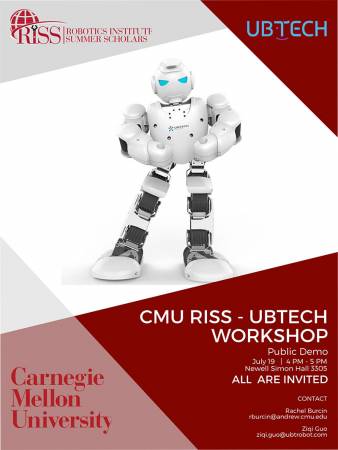Sensor Planning for Large Numbers of Robots
Abstract: Teams of aerial sensing robots can provide valuable situational awareness to first responders during disasters and emergencies by locating victims, mapping environments, identifying hazards, and locating gas sources. While individual sensing tasks may feature a variety of goals, many tasks will be time-sensitive such as after a widespread disaster or due to imminent danger [...]
Carnegie Mellon University
MSR Thesis Talk – Edward Ahn
Title: Toward Safe Reinforcement Learning in the Real World Abstract: Control for mobile robots in slippery, rough terrain at high speeds is difficult. One approach to designing controllers for complex, non-uniform dynamics in unstructured environments is to use model-free learning-based methods. However, these methods often lack the necessary notion of safety which is needed [...]
CMU RISS – UBTECH Workshop
As part of the RISS-UBTECH Workshop, UBTECH will be doing a Public Demo & Company Overview this Friday. For more information contact: Rachel Burcin or Ziqi Guo
MSR Thesis Talk – Xianyi Cheng
Title: Data-Efficient Stage Classification and Failure Detection for Robotic Screwdriving Abstract: Screwdriving is one of the most common assembly methods, yet its full automation is still challenging, especially for small screws. A critical reason is that existing techniques perform poorly in process monitoring and failure prediction. In addition, most solutions are essentially data-driven, thereby [...]
Wenxuan Zhou – MSR Thesis Talk
Title: Environment Generalization in Deep Reinforcement Learning Abstract: A key challenge in deep reinforcement learning (RL) is environment generalization: a policy trained to solve a task in one environment often fails to solve the same task in a slightly different test environment. In this work, we propose the ``Environment-Probing'' Interaction (EPI) policy, which allows the agent [...]
Abhijat Biswas – MSR Thesis Talk
Title: Human Torso Pose Forecasting for the Real World Abstract: Anticipatory human intent modeling is important for robots operating alongside humans in dynamic or crowded environments. Humans often telegraph intent through posture cues, such as torso or head cues. In this paper, we describe a computationally lightweight approach to human torso pose recovery and forecasting [...]
Carnegie Mellon University
Anjana Kakecochi Nellithimaru – MSR Thesis Talk
Title: Object-level visual SLAM for plant modeling Abstract: A 3D model that can capture the finer details of the plant structure as well as the overall field statistics, plays an important role in automating agriculture. However, modeling and mapping an agricultural field is challenging due to dynamics, illumination conditions and limited texture inherent in an outdoor environment. We propose a pipeline that combines the recent [...]
Carnegie Mellon University
MSR Thesis Talk – Aman Khurana
Title: Behavior planning at roundabouts About the talk: Roundabouts or traffic circles represent a significant portion of unsignalized intersections commonly found in urban and rural roads and pose a specific challenge for autonomous or self-driving cars. In this work, we present model-free techniques that allow a self-driving car to navigate a roundabout safely. We [...]
Arpita Routray – MSR Thesis Talk
Title: Towards retinal membrane peeling with a handheld robotic instrument Abstract: Vitreoretinal surgery procedures demand high precision and have to be performed with limited visualization and access. One such procedure is membrane peeling, which involves peeling of the 5-10 µm thick internal limiting membrane around macular holes. Using virtual fixtures in conjunction with robotic [...]
Carnegie Mellon University
MSR Thesis Talk – Sumit Kumar
Title: Spatiotemporal Modeling using Recurrent Neural Processes Abstract: Spatiotemporal processes, such as temperature in an area, motion of a vehicle, etc., depend on the spatial features of the underlying phenomena as well as time. Developing models that can estimate both mean and uncertainty associated with the prediction is important for building robust systems capable of [...]









